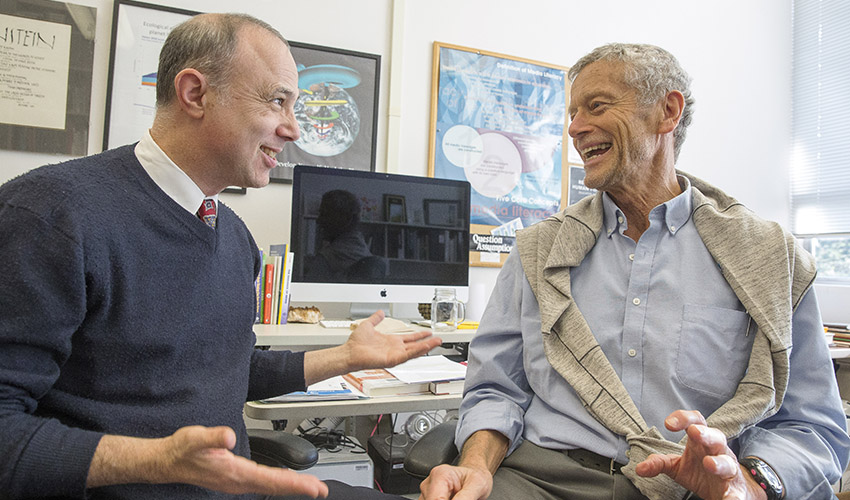Using active placebos would improve clinical studies

SF State professors Richard Harvey and Erik Peper discuss placebos.
SF State researchers say active placebos can better assess new drugs and procedures
Many clinical studies designed to evaluate new drugs and medical procedures are conducted without the use of active placebos, which can lead researchers to conclude that some drugs and procedures are more effective than they really are, according to two San Francisco State University researchers. Professor of Health Education Erik Peper and Associate Professor of Health Education Richard Harvey present their findings in a new article in NeuroRegulation.
In drug trials, an active placebo is usually something like a low dose of caffeine or vitamin B3, which causes some type of harmless side effect (such as increased heart rate or skin flushing). Study participants often interpret those effects as the drug working, according to Harvey and Peper. Using an active placebo offers a more honest test of whether the procedure or drug really works, the researchers contend. Currently, many studies use passive placebos, such as a low dose sugar pill, which cause no side effects and may thus skew study results in favor of the drug.
Active placebos can also be used to evaluate surgical procedures. Peper and Harvey cite studies that show no difference in outcome between arthroscopic knee surgeries and “mock” knee surgeries in which a patient is given local anesthesia and an incision is made but no actual surgery performed. (The mock surgery is a type of “active” placebo because the patient experiences some pain from the incision.) Studies have also shown that injections of certain medications given to hospital patients by a doctor rather than through a machine are more effective due to the patient’s belief in the doctor — another example of an active placebo effect. In other words, your belief that the drug or surgery is working might be helping you feel better.
“The effect you get may not be due to the active ingredient of the medication but to the placebo effect.”
“Many medications or surgical procedures can appear effective, and they may be,” said Peper. “However, many have never actually been compared to an active placebo, only to a passive placebo. Especially with psychiatric drugs or some of the pain meds, the effect you get may not be due to the active ingredient of the medication but to the placebo effect — the body sensations caused by the medication’s side effects.”
The authors say that less than one-half percent of all studies on antidepressants use an active placebo. “If they did, a number of these drugs would never go to market,” said Peper. “The data on antidepressants isn’t that good over the long term if you measure it against exercise, cognitive therapy, etc., which give you similar outcomes. We would argue that positive change is more self-directed and the drug just helps that process.”
Peper and Harvey aren’t suggesting people throw their medications in the garbage — or forego recommended heart surgery, for example. “If you need a valve replacement, the placebo probably is not going to fix your valve,” said Peper. But, the researchers say, data from big pharma may not be as impressive as the studies sometimes indicate.
“We’re not saying anyone lied,” said Peper. “But from a holistic health perspective maybe we should ask what the real efficacy of this drug or treatment is. Could it be due to placebo response to the treatment side effects? And if there are behavioral solutions, maybe we should think about those first.”